I speculated in a previous article that the BBC would attempt to establish a narrative that would promote and support the UK government’s proposed Online Safety Act. And that is precisely what it did in its would-be documentary, “Unvaccinated with Hannah Fry.”
As presenter of the show, Prof. Fry got the relevant propaganda ball rolling when she introduced the segment that supported the UK government’s censorship agenda. She said:
I am really starting to realise that the problem here isn’t so much about a lack of information as it is about this ocean of misinformation that is incredibly hard to wade through. [. . .] The question is how do you possibly tell, when you see things like this, how do you possibly distinguish fact from fiction.
How indeed.
Next, the BBC filmmakers turned their attention to Will Moy, who hammered home the same message when he spoke directly to the participants on the show. Moy is the founder and CEO of the online fact-checking service Full Fact.
When participant Nazarin suggested that the scientific and medical evidence raising concerns about the jabs should be given equal weight to the studies that support the jab rollout, Moy responded:
Let’s be careful about equal, right. I mean, there is very good evidence that the vaccines are safe and effective.
Was fact-checker Moy stating an actual fact?
In Part 1 of this series, we pointed out that the UK Medicines and Healthcare Products Regulatory Agency (MHRA) has not investigated the potentially huge number of serious adverse reactions and deaths that may have been caused by the jabs.
Absent reliable data on the overall level of risk, no plausible risk-benefit analysis exists. And, absent a risk-benefit analysis, there is no evidence, let alone any “good evidence,” to prove that the jabs are “safe and effective.” Thus, Moy’s alleged fact wasn’t a fact at all.
Moy’s comment to Nazarin also exposed a recurrent theme that ran throughout “Unvaccinated with Professor Hannah Fry.” Namely, the show was riddled with undisclosed conflicts of interest.
Conflict of Interest: Jab Science
Moy intimated that the evidence proving the jabs were “safe and effective” outweighed evidence to the contrary. He was correct only in the sense that the overwhelming number of papers produced thus far have been supportive of the jabs.
But just because there are more “pro-jab” papers it doesn’t mean the evidence these papers provide is stronger than the contrary evidence found in the relatively few papers that question the jabs.
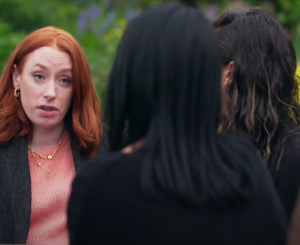
What the proportionately large number of pro-jab papers does indicate, though, is that funding directly and measurably influences the premises and conclusions of so-called scientific research.
This funding bias has long been known to have contributed to a crisis in science. The crisis has been marked by far too many papers that are apparently producing weak conclusions to order.
On the subject of the COVID-19 jabs, for instance, research is frequently funded by the pharmaceutical corporations whose products the papers evaluate. And because government is in league with those very same pharmaceutical corporations, forming what are called public-private partnerships, government’s funding can also present potential conflicts of interest and subsequent bias.
The Cochrane Collaboration conducted a systemic review, published in a February 2009 issue of the British Medical Journal, on the influence of industry funding of published papers studying influenza vaccines. Cochrane ascribed a “concordance” score to the papers, indicating the degree to which the conclusions were evidenced by the reported study results. If the results strongly supported the conclusion, the paper received a high score; if not, it was given a lower score.
In total, 70% of studies were favourable to the flu jabs but only 18% of papers received a high concordance score. The Cochrane review suggested a high degree of bias in more than half (56%) of the papers. The lowest bias risk was given to just 4% of the papers.
Cochrane established that higher concordance was dependent upon methodology. Where methodology was sound, the likelihood of the study supporting the “efficacy” of the respective jab was lower:
[T]he higher the probability of concordance, the lower the probability that a study’s conclusions were in favour of vaccines’ effectiveness[.]
Cochrane also found that corporate and unknown funding was associated with low concordance and unjustified results in favour of the jabs:
[P]oor methodological quality was associated with a discrepancy between results and conclusions, and this in turn was associated with optimistic conclusions in non-government sponsored studies.
Government funded 48% of the reviewed studies, pharmaceutical corporations 29% and 23% didn’t disclose any funding source. Consequently, the Cochrane Collaboration could not establish a “direct association” between corporate funding and low concordance. All we know is that concordance was poor for the studies with declared corporate funding.
Cochrane also found that the 30% minority of reviewed papers that questioned the jabs had consistently higher concordance than the remaining 70% that promoted them. It also found that the lower-quality, more biased pharmaceutical corporation-funded studies were more likely to be published in so-called “prestigious journals.”
Cochrane speculated that this may partly explain political support for global flu vaccination programmes that fail to properly recognise the risks:
Studies partly or completely sponsored by industry, however, were published in more prestigious journals and are probably cited more[.] [T]hese findings might help to explain the continuation of a near global policy, despite growing doubts as to its scientific basis. [. . .] Those sponsored by industry had greater visibility as they were more likely to be published by high impact factor journals and were likely to be given higher prominence by the international scientific and lay media[.]
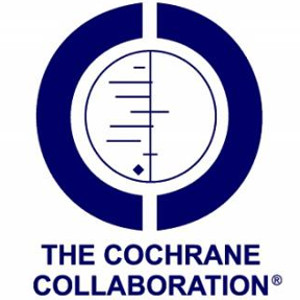 In short, Cochrane demonstrated that the funding of scientific research into influenza vaccines influenced both the conclusions and the reporting of those conclusions. Without being able to catagorically state it, due to the proportion of papers that did not disclose funding sources, Cochrane strongly suggested that “pro-jab” papers were biased by industry funding. Nothing has changed.
In short, Cochrane demonstrated that the funding of scientific research into influenza vaccines influenced both the conclusions and the reporting of those conclusions. Without being able to catagorically state it, due to the proportion of papers that did not disclose funding sources, Cochrane strongly suggested that “pro-jab” papers were biased by industry funding. Nothing has changed.
Moy’s insinuation, that there is more evidence demonstrating COVID-19 jab safety and efficacy, was seemingly a reflection of the number of papers, not their quality or scientific merit. That this unequal distribution of findings in favour of the jabs constituted “very good evidence” was simply his opinion—but it was not a fact. The evidence suggests that he was probably wrong.
For example, the Lancet published a paper, with undeclared funding, that interpreted its own results on waning immunity levels following successive jabs as strong evidence to support “administration of a third vaccine dose as a booster.” Cochrane referred to these kinds of findings as “optimistic conclusions.”
As pointed out by cardiovascular surgeon Dr Kenji Yamamoto, the Lancet paper’s experimental results also suggested that:
[I]mmune function among vaccinated individuals 8 months after the administration of two doses of COVID-19 vaccine was lower than that among the unvaccinated individuals.
Dr Yamamoto also noted that the European Medicines Agency’s (EMA’s) strategy chief, Marco Cavaleri, had warned that repeated doses of the jabs could lead to problems with the vaccinated’s long-term immune response. Consequently, Dr Yamamota interpreted the paper’s results entirely differently and suggested that, “as a safety measure, further booster vaccinations should be discontinued.”
This is not the kind of information the BBC reported in its “eye-opening investigation.” It did not address the known conflict of interest that has led to the crisis in science. Had the BBC mentioned Dr Yamamoto’s observations, it is likely that Prof. Fry would have called them “anti-vax propaganda.”
Conflicts of Interest: Will Moy
“Misinformation” is information that is factually inaccurate but is passed along by a purveyor who is ignorant of the inaccuracy and does not intend to deceive. “Disinformation,” on the other hand, is information the purveyor knows is false yet deliberatively imparts with the intention of deceiving or misleading.
As we shall see, however, both of these terms are being interpreted somewhat differently by the nascent fact-checking industry springing up across the globe.
At the very least, Moy effectively gave misinformation to the BBC’s participants when he contradicted Nazarin. The BBC then offered him to the group as an expert on the subject of mis/disinformation. Moy told the participants:
There is genuinely, I think, hard question about where is this balance between, we should all be able to share our own ideas, but some of those things can cause real harm.
The interpretation of “real harm,” as Moy well knew, is key to the UK government’s plans to roll out internet censorship through its proposed Online Safety Act. The legislation creates the concept of information that may be legal but is allegedly “harmful” to both adults and children. Since there is no definition of “harm” in the bill, the UK government can censor whatever it chooses simply by calling it “harmful.”

Moy introduced the concept of unspecified “harm” into the BBC segment presumably because his company is lobbying and campaigning for the legislation. Belying his claim that it is an “independent” fact-checking organisation, Full Fact was initially set up with seed money from the City of London Corporation, from George Soros’ Open Society Foundation and from Rolls Royce, to name a few of its funders.
We can only surmise that global financial institutions, international currency speculators and defence contractors have the interests of the public at heart and want to make sure everyone has access to only the “right” information.
Full Fact is part of the International Fact Checking Network (IFCN), established to police publicly available information on behalf of governments and multinational corporations.
Currently Full Fact earns a fair chunk of its money by providing so-called fact-checking services to social media giant Facebook (Meta). Not surprisingly, in response to these legislative moves by governments around the world, not just in the UK, Meta has already quadrupled its online safety and security teams.
Full Fact’s role with Meta is not to check facts but rather, as explained by Meta CEO Mark Zuckerberg, to ensure that nothing contravenes what he calls “protected opinion.” Meta’s investment will see the necessary expansion of its third–party fact–checking program, designed to “fight the spread of misinformation.”
“Misinformation,” it seems, is now considered to be any information that government has labelled as “harmful” or any that contradicts “protected opinion.”
Will Moy is deeply connected within government, having “served on advisory groups” for the UK government’s Economic and Social Research Council and for the Treasury and having regularly given “evidence to select committees.” For example, Moy was invited to contribute to the February 2021 House of Lords Select Committee on Communication and Digital, where the role of the alleged “fact checker” was discussed.
During that hearing, Dr Lucas Graves, a senior research fellow at the UK Reuters Institute, suggested that the Committee might consider:
[. . .] what sorts of policies we might choose to layer on top of the work of fact-checkers[.]
He also observed:
[F]act-checking organisations such as Full Fact [. . .] almost never think of themselves as wanting to police speech. That is a burden that they are very reluctant to take on[.]
In so saying, Graves revealed the fundamental problem that undermines the entire concept of fact-checking. That is, fact checkers like Full Fact have been empowered to define and arbitrate the “official” truth. Whether “reluctant” or not, they have assumed the mantle of king, on the “fact” throne, from which they rule over not just their own nation-state’s “truth” but also global “truth.”
Take UNESCO’s recent campaign “Think Before Sharing,“ which makes the allegation that so-called conspiracy theories are dangerous. It suggests that social media users can protect themselves from these dangers by ensuring the authors are suitably qualified and by assessing whether “the tone” of the content is factual.
Putting aside that UNESCO’s first recommendation is to indulge in logical fallacies and its second to value subjective judgements that have nothing to do with evidence, the UNESCO—a global intergovernmental organisation—is also urging people to make sure their sources are approved by “fact-checking sites.” Today we see fact-check services being used across social media precisely for the purpose of “policing speech.”
The industry would not exist were it not for the age-old but heightened political obsession with controlling information. Politicians seek to use the fact checkers’ “rulings” as justification for their policy decisions.
When those same fact checkers are political lobbyists, whose close relationship with the political class enables them to sell services that are dependent upon policy decisions, the conflict of interest is so profound there is little reason to believe anything they say. Fact checkers are first and foremost defenders of the establishment’s preferred narrative—of “protected opinion,” as Zuckerberg put it.
In the aforementioned House of Lords select committee, Moy tossed around words like impartiality, transparency, accountability. But those noble-sounding goals were betrayed by his rank admission:
[. . .] we are first responders to the emergence of misinformation.
So, who made Full Fact the “truth” authority? For the answer, we need only look at its funding sources: the same corporations, foundations and billionaires who fund political parties and spend millions lobbying for policies that favour their interests. Indeed, Moy exemplified the incestuous relationship between the fact-checking industry and the politicians when he told the select committee:
[. . .] we can identify emerging harms. [. . .] The keystone for us is thinking about harm: what harm would be done if this thing were wrong?
Moy’s testimony to the House of Lords almost certainly followed the advice of Full Facts’ head of policy and advocacy, Glen Tarmen, whose stated remit is:
[. . .] securing changes from those in governments, parliaments, the media, internet companies and beyond that influence people’s exposure to bad information and its harms.
Full Fact is actively influencing government to secure the changes that bolster its business opportunities. Contradicting government on major policy initiatives such as universal vaccinations programmes, is not in Full Fact’s interest.
Back to Moy’s objective in speaking with the participants on the BBC programme. His suggestion that some of their “anti-vaxx” opinions could “cause real harm” was a sales pitch. The BBC’s participants and audience didn’t known that, because the BBC didn’t disclose Moy’s massive conflict of interest.
Conflict of Interest: Professor Adam Finn
During the BBC programme, Prof. Fry took three of the participants to visit Professor Adam Finn. She told them that he has been “instrumental in COVID-19 vaccine research.” Her narrated introduction to Professor Finn noted:
Having led clinical trials for Oxford AstraZeneca and Janssen and the newest vaccine, Valneva, Professor Finn is an expert in how vaccines work.
For some reason, the BBC did not disclose that Prof. Finn is also the leader of the Pfizer Centre of Excellence for Epidemiology of Vaccine-preventable Diseases at the University of Bristol—as later pointed out by Professor Norman Fenton. The Vaccine Centre of Excellence was opened in May 2021 by then-UK Health Secretary Matt Hancock. Prof. Finn remains its director (official title “lead”) to this day.
In Part 1, we explored the appalling lack of regulation and almost the complete absence of any oversight by the MHRA. Pharmaceutical corporations were able to acquire emergency use authorisation and Conditional Marketing Approval (CMA) for their products without even producing completed trial results.
When BBC participant Ethan asked Prof. Finn how it was possible for the jabs to be developed and approved so quickly, Finn replied:
The speed with which these vaccines were developed was unprecedented. The way it was done, was not by missing out steps that we normally do, it was by taking an enormous financial risk that you wouldn’t normally take.
If we look at the study design of Pfizer’s BNT162b jab, which was the first COVID-19 jab given emergency use authorisation by the MHRA in December 2020, the stated primary completion date for the trial is February 8, 2024.
“Primary completion” means:
The date on which data collection is completed for all the primary outcome measures.
The secondary outcomes have the same completion date. There are “no results posted for this study,” and much of the crucial testing and surveillance was incomplete when the jab was “approved” via emergency use authorisation. For example, the trial design necessitated collection of the following data:
In Phase 1 participants, SARS-CoV-2 serum neutralizing antibody levels, expressed as GMTs [ Time Frame: Through 2 years after the final dose ]
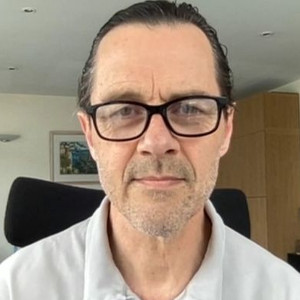
Pfizer didn’t even submit this data until April 2022, more than a year after millions of people had already been injected with its product. By then Pfizer had rebranded its drug Comirnaty to enable the MHRA to give it Conditional Marketing Authorisation.
Comirnaty and BNT162b2 are one and the same, but branding is required for marketing approval. Yet, though Comirnaty now has marketing approval, it still hasn’t completed trials.
So it is difficult to know what Prof. Finn was talking about. The jabs were not developed with “unprecedented” speed. Development is dependent upon trial results. Trials were planned as usual but aren’t complete and have largely been abandoned. The jabs are yet to be fully “developed,” while experimental testing on the population continues.
How Prof. Finn could describe this as not “missing out steps that we normally do” is equally unfathomable. Pfizer didn’t complete any of the normal steps. The “steps” were ignored.
Then there was his claim about the “enormous financial risk.” This wasn’t a financial risk that the pharmaceutical corporations bore alone, or barely at all. They were supported by their government partners, which pumped billions of taxpayers’ money into jab development.
For example, COVAX brought together the Coalition for Epidemic Preparedness Innovations (CEPI) and Gavi and the World Health Organization (WHO) to “accelerate the development, production, and equitable access to COVID-19 tests, treatments, and vaccines.”
CEPI’s “investors and partners” include the UK, US, Canadian, German and Australian governments alongside the likes of the Wellcome Trust, the Bill and Melinda Gates Foundation and the EU. It seems it was actually the taxpayers who were taking the “financial risk.” But they certainly didn’t receive a share of the profits.
AstraZeneca posted a 48% revenue increase to just over £22Bn across its entire business for the first half of 2022. Similarly, Pfizer reported all–time high revenue and excellent profits for 2021, representing 92% operational growth that was mainly driven by sales of its Comirnaty (BNT162b2) jab. Pharmaceutical corporations have enjoyed fantastic growth and revenues as a result of the pseudopandemic.
The manufacturers of the jabs would not even begin testing their products on the public without government guarantees of immunity from civil prosecution for any harm they caused, which they duly received.
The pharmaceutical corporations’ development costs were supported by government, intergovernmental organisations, philanthropic foundation and other corporate partners, and they had a guaranteed market. Their limited, alleged “financial risk” looks like a sound, very low-risk investment.
There was no “enormous financial risk,” despite Professor Finn’s claim to the contrary. There was an “enormous” taxpayer-funded investment, but the risk, from a corporate perspective, was virtually nil. The product manufacturers faced no liability risk and hardly any investment risk, and the products they delivered weren’t even trialled before being sold and distributed.
Professor Finn appeared to have been eulogising the jab developers, alleging they took enormous risks on behalf of the public. In reality, nearly the entire risk was shouldered by the public. There seems a distinct possibility that Finn’s role, as the head of Pfizer’s Centre of Excellence, influenced his opinion. Given his position, it is incredible that he also told the BBC’s participants:
People like me and people like the regulatory authorities exist as a kind of buffer in between them [the pharmaceutical corporations] and the public. And if results come out that companies might not like the look of, it’s my job to publish them and make sure that everyone knows what’s going on.
Prof. Finn suggested that he and the regulators were somehow independent of the drug industry. Nothing could be further from the truth. The UK regulatory authority, the MHRA, no longer considers itself to be a “watchdog” but rather an “enabler” for pharmaceutical products.
The cost of the MHRA’s alleged regulation is “met by fees from the pharmaceutical industry.” In the UK, as elsewhere, the pharmaceutical corporations fund their own regulatory body.
In response to concerns about Prof. Finn’s undisclosed conflict of interest, raised by Prof. Fenton, the BBC said:
Professor Finn leads a research group within the Pfizer Vaccine Centre of Excellence – where his work in relation to Covid-19 vaccines is independent of Pfizer.
This was another disingenuous side-step by the BBC. Unsurprisingly, the Pfizer Centres of Excellence are funded by Pfizer. And since Prof. Finn heads up the UK Center, he is presumably being paid by Pfizer—unless he’s doing that work for free.
His claim that he will keep the public informed about the science that could damage industry profit margins can and should be questioned, due to his apparent conflict of interest that neither he nor the BBC chose to disclose. In light of the BBC’s edited broadcast of Prof. Finn’s statements, made during the programme, the chance of him telling the public anything that suggests reason for concern seems remote.
Conflict of Interest: Professor Asma Khalil
In Part 1, we discussed some of the scientific and statistical evidence that brings into question the claims made by Professor Asma Khalil during the BBC programme. Yet her statements were reported by the BBC as if they were unassailable facts.
Specifically, Prof. Khalil told concerned participants that the jabs were beneficial for pregnant women and that “studies show” that the jabs reduce the chance of stillbirth by 15%. She made this claim based upon her own research paper [Prasad et al. — 2022] on prenatal outcomes following the injection of pregnant women with the mRNA jab.
Neither Prof. Khalil nor the BBC informed either the participants or the BBC audience that Prof. Khalil’s statement was “not entirely accurate.” Other researchers have been unable to replicate the results of Prasad et al. When they applied that same statistical analysis to the same datasets, they concluded:
Prasad et al. does not support the statement that vaccination decreases the risk of stillbirth. [. . .] [T]he results cannot be replicated using the same software, the same statistical package, and the same choice as deducted from the publication. [. . .] We notified the authors of these findings, to which we received the reply that the study design stratified analysis is not entirely accurate[.] [. . .] [I]t is perhaps best if such findings are purposefully downgraded to prohibit any grand claims on the protective effects of vaccinations[.] [. . .] [T]hat is not what evidence-based medicine should be about.
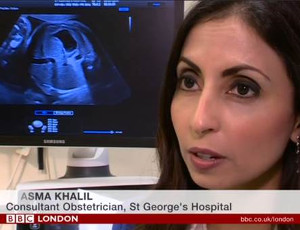
As we discussed, Prof. Khalil’s other claims about safety in pregnancy do not chime with the current statistical evidence, either. Prof. Khalil hasty assertions would probably have received more scrutiny had the BBC chosen to disclose her conflicts of interest.
The Ethical Considerations section of Prasad et al. lists Prof. Khalil as the Principle Investigator (PI) for “Pfizer COVID vaccination in pregnancy trial.” The Contribution section of Prasad et al. notes that she also “interpreted data and revised the manuscript for important intellectual content.”
NHS England describe Professor Khalil as “one of the UK’s leading medical entrepreneurs.” She is a former director of Trakka Medical ltd, which developed the HaMpton app for monitoring pregnant women’s blood pressure. The HaMpton app monitors the patient’s biomedical data and links it to public health service patient monitoring systems in real time.
Prof. Khalil is a fellow of the NHS Innovation Accelerator, which, coincidentally, supported her in developing and marketing her app. Her product development, safety licensing and ethical approval were also assisted by the MHRA’s innovation accelerater, whose “innovative licensing and access pathway” enabled Prof. Khalil to “accelerate the time to market.”
This experience may have influenced the advice she gave to the COVAX Maternal Immunisation Committee. The Committee concluded that policy makers need to be educated to address “misconceptions” about the risk/benefits of the jab. So Prof. Khalil’s “misconception” about reduced stillbirth risks being attributable to the jabs was unfortunate.
The NHS Innovation Accelerator, of which Prof. Khalil is a fellow, is hosted by UCL Partners, which is billed as the largest academic health science centre in the world. UCL’s research partners include the London School of Hygiene and Tropical Medicine (LSHTM), UCL (University College London) and Queen Mary University London.
These academic institutions have been instrumental not only in Prof. Fry’s research but also in creating one of the most amazing coincidences in the history of global public health—one that has the BBC right at the heart of it. It is this unbelievable coincidence and its staggering implications that we will investigate in Part 3.

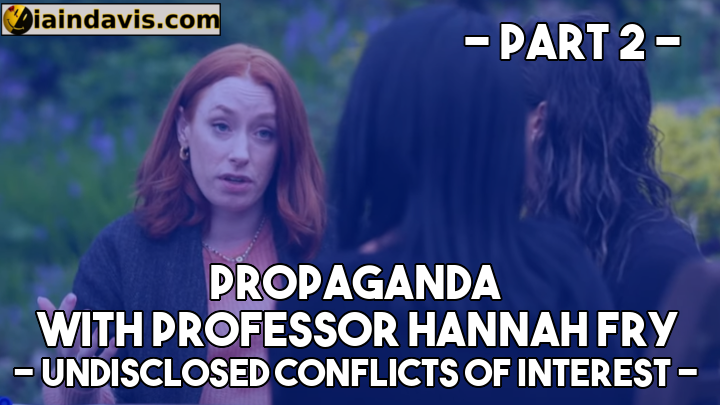

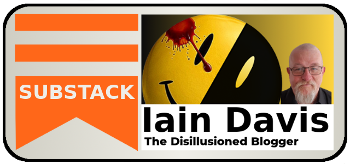

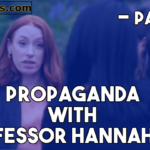
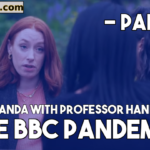


It is worth noting, that since the dawn of the spoken word, the Elites have always sought to control the narrative.
This has continued through time, whether it is Messenger, Town Crier, hand written, printed, or transmitted communications.
Radio & TV transmissions are controlled by Government licence, & printed word controlled, ultimately, by the Owners.
The Internet has become a real thorn in the side of the authorities since its creation, & has proven more difficult to tame, but as the serious money becomes involved, so does the influence.
In the case of the BBC, it has become clear in recent years that the reporting has become very one sided, & if anybody, who has an alternative view to the established norm (protected Opinion) , slips through the net, they will not be allowed to have a platform at best.
The real question here is why this program went out at all, since I don’t know anybody who hasn’t moved on from Covid, & those of us who have been vaccinated are through with it now anyway.
Who cares about those who haven’t had the vaccine – they don’t, & since we know it doesn’t stop the spread of Covid19 anyway, why should anybody else?
I think the answer lies with the Drivers of the Great Covid Gravy Train, who have become drunk on Tax Payer’s money during the Pandemic – they can’t let a good thing go, & won’t let it go at the MSM either.
Never mind Chaps – dry your eyes, because there’s always Monkey Pox to fall back on.
Don’t forget where you heard it 1st.
Thank for a great comment Mike. Personally I suspect it was pitched at those who had the first two shots but decided not to take up boosters (for whatever reason). There’s a big drop off in uptake.
Iain, your link to subscribe to your newsletter (and free .pdf of “Pseudopandemic” isn’t working. (11 August 2022)
Yep sorry about that. I’m ghaving a few hosting issues. Nothing sinister, hopefully will be back up working soon.
Contrary to the comment from Mike Wilson, though I agree with most of his points, I don’t think we should ever move on from Covid. I’m un-jabbed, utterly proud to be so and feel let down not only by the government but by all those who just rolled up their sleeves for an easy life. I will also never forgive or forget the legion of doctors who have pushed and coerced folk into taking what is now obviously a useless and, for many, harmful experimental intervention for something they were at virtually zero risk from. We are now seeing upward of 1500 excess deaths per week in the UK and this is a common feature throughout the ‘developed’ west where the uptake of the jab has been highest. This was all part of the plan, was predicted by us tin-hatters way way back in late 2020/early 2021 and anyone who wants to ‘move on’ and turn a blind eye to this need to think again. 1500 deaths is the equivalent of eight Being 737s crashing in the UK every week. If that was happening would folks want to ignore and move on ? The BBC should be utterly ashamed of themselves the way they have behaved this last two plus years and it is comforting to me that so many are switching them off and cancelling their licence fee Direct Debits.
Thanks Andrew. It is an apalling situation and I hear what you are saying about those who so easily capitulated to state pressure. However, they were also subject to a concerted propaganda campaign and lies from those they trusted, if unwisely. We can’t move forward without extending some understanding and compassion to those who are now perhaps regretting their jab decision. While it is true that those of us who declined the jabs were subjected to dehumanising propaganda, which some people were eager to promote, nonetheless. I think we need to put aside those divisions if we are going to tackle the rest of the agenda.
Hello Andrew,
Please see my reply to Iain’s next report for a better understanding of who I was referring to when I said “we” need to move on, because it seems the likes of Tony Blair & the Big Pharmaceutical companies have no intention of doing so, & the government is already using the MSM to prime us up for the next generation CV19 vaccine roll out before the last has even been completed.
Prepare for lashings of “Get Covid Vaccinated to Save the NHS” propaganda yet again, in an attempt to patch up a health service that has already been irreparably damaged by lock downs, isolations, Covid restrictions, & vaccine roll outs that were supposed to save it in the 1st place.
The comparison with aircraft crashes is not a good one, because the aircraft companies & Insurers would ultimately be accountable, but not so the Pharmaceutical Companies who worked suitable angles to protect themselves.
Personally I see no divisions here – there are an increasing number of us who now know we have been had, and there are those – like you – who had no intention of being had in the 1st place, but we now find ourselves at the same place of understanding never the less.
Great detailed analysis, thank you. When I watch police dramas, it is attention to detail that nails the criminal.
You are welcome Alison. Thanks for reading and sharing it.